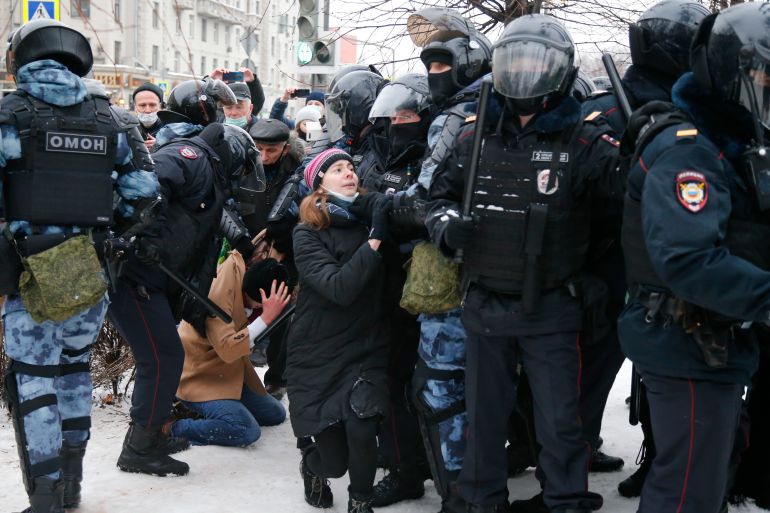EU weighs response to Russian crackdown on pro-Navalny rallies
Tensions between the West and Russia have mounted after thousands were arrested at pro-Navalny rallies.

The European Union will consider fresh sanctions on Russian individuals after more than 3,000 people were arrested across Russia on Saturday for protesting to demand the release of Kremlin critic Alexey Navalny.
As EU foreign ministers arrived for the meeting in Brussels on Monday, the EU’s top diplomat said the arrests were of great concern and that the group would discuss its response in the next hours.
Keep reading
list of 4 itemsAlexey Navalny timeline: From poisoning to prison to death
Russia arrests thousands amid unprecedented pro-Navalny protests
What is Alexey Navalny’s endgame?
“We will deal with the worrying events in Russia,” EU foreign policy chief Josep Borrell said. “This wave of detention is something that worries us a lot, as well as the detention of Mr Navalny.”
Lithuania’s foreign minister, arriving for the meeting of the bloc’s 27 top diplomats, said “a change is in the air in Russia” that the bloc must support, especially after Navalny’s detention as he returned to Russia from Germany.
“This is what makes [Russian President Vladimir] Putin so nervous … That’s why he detained 3,500 people in the streets. That’s why he detained Mr Navalny. That’s why he detained his wife.
“The EU needs to send a very clear and decisive message that this is not acceptable.”
The EU has already placed economic sanctions on the Russian energy, financial and arms sectors over its 2014 annexation of the Crimea Peninsula and has imposed sanctions on Russian officials close to Putin in response to Navalny’s alleged poisoning in August.
Fellow Baltic countries Latvia and Estonia support more EU sanctions on Russian individuals, and Italy’s foreign minister said on Sunday that Rome was ready to support more travel bans and asset freezes. Romania publicly backed sanctions on Monday.
German Foreign Minister Heiko Maas demanded the immediate release of protesters who had braved the extreme cold to call for Navalny’s release, but did not make further comment.
In central Moscow on Saturday, where thousands had gathered in one of the biggest unauthorised rallies for years, police were seen roughly detaining people, bundling them into nearby vans.
Germany and France, the EU’s main powers, will be central in deciding if the bloc goes ahead with punitive measures on Russia, a big oil and gas exporter to the bloc, although no detailed list of names is expected to be decided on Monday.
Navalny says Putin was behind his poisoning last August, a claim the Kremlin rejects.
The Kremlin says it has seen no evidence that Navalny was poisoned and that it would not heed calls by some Western countries for sanctions over Navalny’s detention because his case is a domestic matter.
Many European countries have called on Russia to answer questions over the alleged poisoning attack, but have stopped short of outrightly blaming the Russian authorities or Putin.